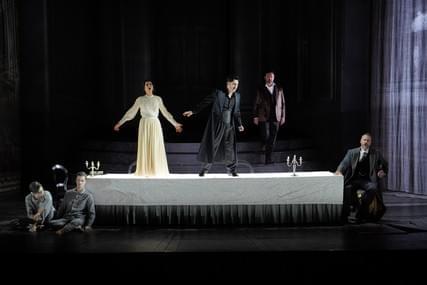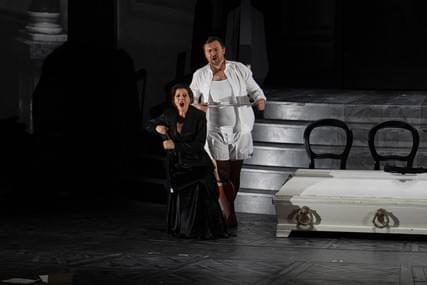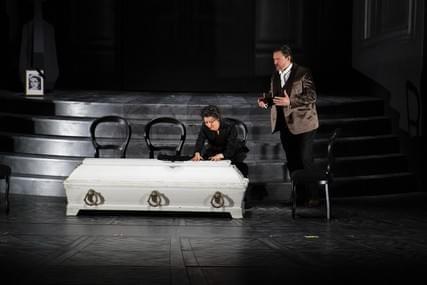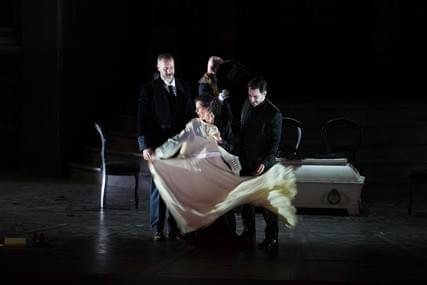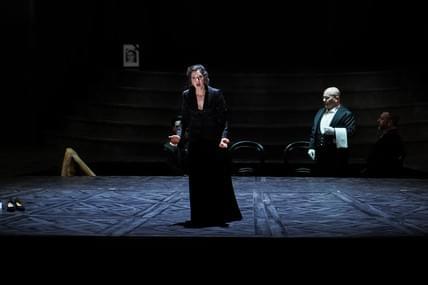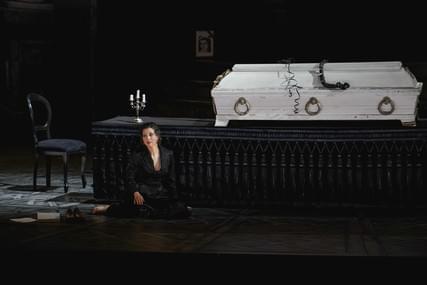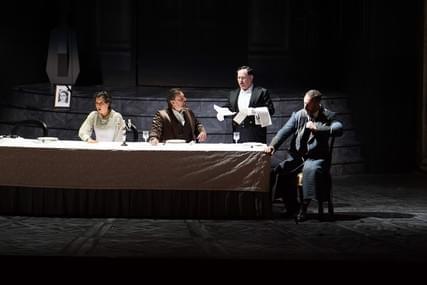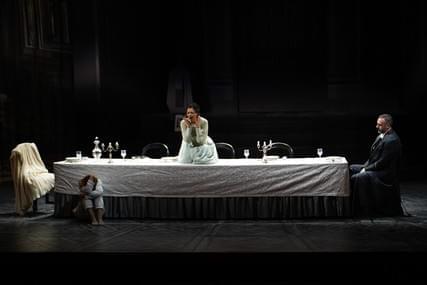Cast
| Massimiliano | Christian Van Horn | |
| Carlo | Charles Castronovo | |
| Francesco | Igor Golovatenko | |
| Amalia | Lisette Oropesa | |
| Arminio | Kevin Conners | |
| Moser | Alexander Köpeczi | |
| Rolla | Jonas Hacker |
Antonino Fogliani
ProductionJohannes Erath
Set DesignerKaspar Glarner
LightingOlaf Freese
VideographerLea Heutelbeck
ChorusmasterStellario Fagone
DirectorMalte Krasting
About
Melodramma tragico in four acts - 1847
Composer Giuseppe Verdi. Libretto by Andrea Maffei after Friedrich Schiller's play „Die Räuber“.
In Italian with German and English surtitles. New Production.
Synopsis
I Masnadieri tells the story of Carlo, a man who abandons his familial responsibilities and falls in with a nefarious group of bandits (the "masnadieri"). This decision incurs the wrath of his brother, Francesco, who plots to seize control of the family's wealth in Carlo's absence. Meanwhile, Carlo's father, Massimiliano, is left to lament the loss of his son and slowly succumbs to illness. The woman whom Carlo left behind, Amalia, is also consumed by longing and uncertainty regarding his whereabouts.
Upon receiving false news of Carlo's death, the family and Amalia mourn his passing. However, upon learning that the reports were erroneous, Amalia rejoices while attempting to evade Francesco's attempts to force her into marriage. In a heinous act, Francesco buries Massimiliano alive, yet he is saved by the actions of a loyal servant. Amalia eventually comes across Carlo and his band of outlaws, but he keeps the truth of his criminal activities hidden from her, leading her to believe that he plans to return to his family.
Upon overhearing the servant tending to his gravely ill father, Carlo decides to seek revenge against Francesco. The latter has a terrifying vision of damnation and is visited by a priest, who informs him that he will be held accountable for his nefarious actions. Francesco's conscience catches up with him and he ultimately perishes. Carlo and Massimiliano share a poignant father-son duet, but the band of thieves demands Carlo's return to their ranks. He is unable to return to his family and reluctantly admits the truth to both his father and Amalia. Despite her desire to join him in a life of crime, he insists that she remain pure and chooses to kill her to protect her from the darkness he has come to know.

Interview - Süddeutsche Zeitung
Lisette Oropesa talks with the Süddeutsche Zeitung about her career and I Masnadieri at the Bayerische Staatsoper

❄️ Lisette's Winter 2023 Newsletter
❄️ Lisette's Winter 2023 Newsletter\!
Reviews
"I Masnadieri" im Nationaltheater: Weiblich neu
Lisette Oropesa überraschend viele Wesenszüge von Verdis späteren Frauenrollen: Sie bindet in den Cavatinen und Cabalettas die Spitzentöne zwar makellos pianissimo in die Linie ein. Doch ihr Legato ist unter der zart lebendigen Oberfläche sehnig gestützt, die Melodien hält sie entschlossen fest und spannt sie in der Staatsoper zu enorm tragfähigen Bögen auf. Und Lisette Oropesas düstere Tiefe lässt an die Dramatik der Lady Macbeth denken, die wenige Monate vor den "Masnadieri" das Licht der Welt erblickt hatte.Lisette Oropesa surprisingly embodies many characteristics of Verdi's later female roles: She seamlessly incorporates the high notes, played perfectly pianissimo, into the line of the cavatinas and cabalettas. However, her legato is braided with flexile support underneath its gently vibrant surface, she firmly holds onto the melodies and structures them into enormously supportive arcs at the Staatsoper. And Lisette Oropesa's somber depth is reminiscent of the drama of Lady Macbeth, who had been brought into the world a few months before "Masnadieri".— Michael Bastian Weiß • Abendzeitung München
Oropesa y los 'Masnadieri'
Lisette Oropesa supo calmar al público, llevándolo consigo al mundo de colores del belcanto. El nombre de la soprano estadounidense era el reclamo principal de la tarde, pero su fingida fragilidad –que tanto agrada a los nostálgicos de una diva pasada en particularLisette Oropesa managed to soothe the audience, taking them along to the colorful world of bel canto. The name of the American soprano was the main draw of the evening, but her feigned fragility - which is so pleasing to those nostalgic for a particular past diva.— Johannes Erath Múnich • Opera Actual
Lisette Oropesa y Giuseppe Verdi, una pareja bien avenida
El núcleo musical de esta ópera es la soprano, hecho que en este reparto se cumple doblemente, al ser Lisette Oropesa quien interpreta el papel de Amalia. Oropesa es una de las cada vez más raras representantes de una tradición que está siendo peligrosamente abandonada. Al oírla se tiene la impresión de estar frente a una de las grandes sopranos líricas italianas del siglo pasado. En esta Amalia su interpretación se centra en la musicalidad y en la interiorización del drama en la melodía. La intensidad se logra por medio de concentración más que de expansión. El secreto está, seguramente, en su al mismo tiempo sobria y muy matizada articulación. No hace concesiones al virtuosismo acrobático, si bien luce agilidades cuando es necesario. La línea melódica y el inspirado fraseo son diáfanos y ricos en matices. La voz de Oropesa, al margen de su abundancia de armónicos, de su naturalidad y de su aterciopelada belleza, ejerce una irresistible seducción. Su presencia escénica, siempre carismática, otorga al personaje una dignidad y una credibilidad sin fisuras.The musical core of this opera is the soprano, a role doubly fulfilled in this cast, as Lisette Oropesa takes on the role of Amalia. Oropesa is one of the increasingly rare representatives of a tradition that is being dangerously abandoned. Listening to her gives the impression of facing one of the great Italian lyric sopranos of the last century. In this Amalia, her performance focuses on musicality and the internalization of drama within the melody. Intensity is achieved through concentration rather than expansion. The secret surely lies in her at once sober and highly nuanced articulation. She makes no concessions to acrobatic virtuosity, although she displays agility when necessary. The melodic line and inspired phrasing are clear and rich in nuances. Oropesa's voice, aside from its abundance of harmonics, its naturalness, and its velvety beauty, exerts an irresistible seduction. Her stage presence, always charismatic, grants the character a dignity and credibility without flaws.— J.G. Messerschmidt • Mundo Classico
Abel et Caïn enfants du Roi Lear
Reste la stupéfiante Lisette Oropesa qui en quelques années a conquis les premières places dans les rôles de soprano lyrique d’agilité. La voix est large, elle a une belle assise, dotée d’une technique de fer, au contrôle de tous les instants dans tout le registre, sachant filer les notes, mesurer le volume, doser les effets avec une attiutude scénique toujours adaptée, ne surjouant jamais, étonnamment naturelle.Then there's the astounding Lisette Oropesa, who in just a few years has conquered the top spots in agile lyric soprano roles. Her voice is powerful, with a solid foundation, boasting an ironclad technique, constantly in control across the entire range, knowing how to extend the notes, regulate the volume, and measure effects with a stage presence that's always appropriate, never overacting, strikingly natural.— Guy Cherqui • Wanderer
Performance History
Lisette has given 18 performances as Amalia.



